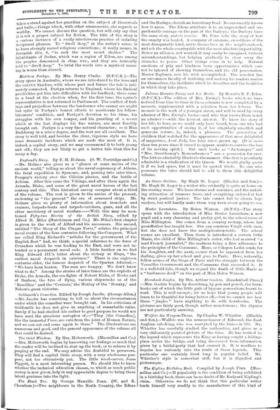England's Navy. By F. M. Holmes. (S. W. Partridge and
Co.) —Mr. Holmes also gives us a " glance at some navies of the ancient world," telling us about the naval supremacy of Athens, the fatal expedition to Syracuse, and, passing into later times, Pompey's victory over the Cilician pirates, and the battle of Actium. After this come the Vikings, and after them again the Armada, Blake, and some of the great naval heroes of the last century and this. This historical survey occupies about a third of the volume. The rest is given to the navies of the present, reckoning as " the present " the era of armoured ships. Mr. Holmes gives us plenty of information about ironclads and cruisers, torpedo-boats and torpedo-catchers, guns, and all the other machinery of naval warfare.—With this may be men- tioned Fifty-two Stories of the British Navy, edited by Alfred H. Miles (Hutchinson and Co.) Mr. Miles's first chapter is given to the work of Alfred and his successors. His second, entitled " The Story of the Cinque Ports," relates the principal naval events of the four centuries following the Conquest. What are called King Richard's "articles for the government of the English fleet" had, we think, a special reference to the force of Crusaders which he was leading to the East, and were not in- tended as a permanent naval code. A little further on we find King Edward III.'s letter about the victory at Sluys, "the earliest naval despatch in existence." There is one eighteen centuries older, the famous despatch of the Spartan Admiral,— " We have been beaten. The men are hungry. We don't know what to do." Among the stories of later times are the exploits of Drake, the Armada, the sea-fights of Robert Blake, of Rooke and of Benbow, the fate of Byng, various shipwrecks as of the ' Ramillies' and the 'Centaur,' the Mutiny of the ' Bounty,' and Nelson's great victories.






















































 Previous page
Previous page